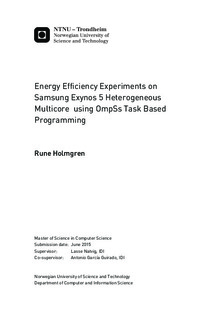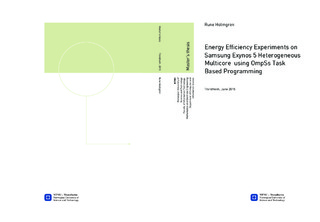| dc.description.abstract | This thesis explore the energy efficiency of task based programming with OpenMP SuperScalar (OmpSs) on the heterogeneous Samsung Exynos 5422 system on a chip. The system features small energy efficient cores, large high performance cores and a GPGPU, and OmpSs tasks were run on all three different processors. Experiments running a genetic algorithm and a Cholesky decomposition were used to gather results.
The option of running applications on the energy efficient cores, on the high performance cores or on a combination of processor cores and the GPU, allow programs to chose between energy efficiency or performance as necessary. The results showed that the energy efficient cores are the best option when performance is not an objective, while utilizing both high performance and energy efficient cores together gives the highest performance. For applications that are suited to utilize the GPU, it is possible to get a large increase in both performance and energy efficiency.
The complexity of developing parallel applications is one of the main obstacles of heterogeneous systems. The results showed that task based programming is a feasible solution to make development less complex, while maintaining both the parallel performance and energy efficiency of the system. | |

